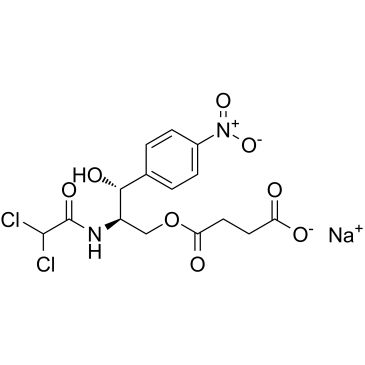Participation of macrophages in chloramphenicol-potentiated carrageenin-induced peritonitis in rats.
J R Moraes, F R Moraes, G H Bechara
Index: Braz. J. Med. Biol. Res. 26(5) , 497-507, (1993)
Full Text: HTML
Abstract
1. We investigated the possible potentiating effect of chloramphenicol succinate (30 mg/kg, every 12 h for 4 days, ip) on the response of polymorphonuclear neutrophils to carrageenin (150 micrograms, ip) or dextran (100 micrograms, ip) in the peritoneal cavity of male Wistar rats (180-230 g; N = 12 in each group). 2. Chloramphenicol potentiated the cell migration induced by carrageenin (35%) but not that induced by dextran. Previous macrophage depletion in the peritoneal cavity by washing with sterile saline abolished the cell response, whereas a previous thioglycollate-induced increase in macrophage numbers enhanced the potentiating effect (60%). 3. These results suggest that the potentiating effect on polymorphonuclear neutrophil migration induced by chloramphenicol may be related to chemotactic factors released by macrophages.
Related Compounds
| Structure | Name/CAS No. | Molecular Formula | Articles |
|---|---|---|---|
 |
Chloramphenicol sodium succinate
CAS:982-57-0 |
C15H15Cl2N2NaO8 |
|
The myelotoxicity of chloramphenicol: in vitro and in vivo s...
1998-01-01 [Hum. Exp. Toxicol. 17(1) , 8-17, (1998)] |
|
A commercial enzyme immunoassay method (EMIT) compared with ...
1988-09-01 [Clin. Chem. 34(9) , 1872-5, (1988)] |
|
Chloramphenicol succinate, a competitive substrate and inhib...
2004-08-01 [Toxicol. In Vitro 18(4) , 441-7, (2004)] |
|
Fluorometric quantitation of broth-cultured mycoplasmas by u...
1993-05-01 [J. Clin. Microbiol. 31(5) , 1303-7, (1993)] |
|
Metabolism of chloramphenicol succinate in human bone marrow...
2000-08-01 [Eur. J. Clin. Pharmacol. 56(5) , 405-9, (2000)] |